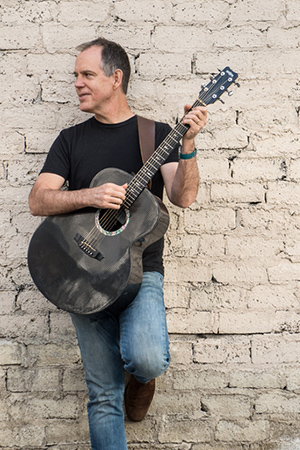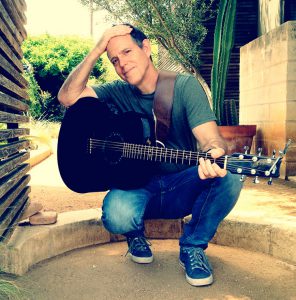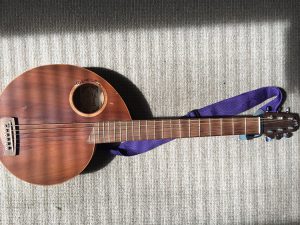David Wilcox
creating his own extraordinary acoustic path

“To me, acoustic music has always been about the audience being drawn in a little closer in a way that is for me revolutionary, vulnerable, powerful.”
When I first came to acoustic music, to me it felt like revolution. It felt like these were sort of tools that you could carry when you’re traveling light and living cheap. They are tools that are not dependent on the grid let alone the music industry. They’re tools that don’t require a venue. That you can play on the street. When I was playing on the street, I was making a living that was better than if I had had a minimum wage job which was my option back then. I thought, “You know, this is not going to hurt me. Most of all, it’s going to bring me life. Not just going to be living, it’s going to be a life.”
artist details
Website: davidwilcox.com
Heroes: John Martin, Nick Drake, Joni Mitchell, Check Pile, Bob Franke
Favorite: Love to play them all
Touring: See him live
AL About performing on the road with your Rainsong graphite guitar
DW I love the RainSong. I love traveling with it. I love making it sound unbelievably good. My opinion is, if you’re going to be playing for more than 10 people, you’re going to be playing to a sound system. People aren’t hearing your guitar; they’re hearing your transducers and your amplification. If you have a little 9-volt crap on your guitar and it’s going to hiss and hum, that’s not doing anybody any good. You have to have 48-volt phantom [power]. You have to have a choir of pickups, because not any single pickup can make the sound of a guitar. Because the sound of a guitar is not made from one surface. It’s made from the end side and the back and the front and the shoulders and the waist. It’s all over the place.
Unless you’re traveling with a semi, unless it’s going to go in a huge anvil case, [a vintage instrument ] is not appropriate technology. I mean, it might be fun to play those guitars, but it’s not like the audience is going to hear it any different. If you’re traveling sort of ground level like I am, it’s not realistic because you’re going to waste all your emotional energy worrying about the guitar. You really should be spending your emotional energy where it counts, on the audience.
AL When you’re home, you have a variety of guitars and maybe they’re all different paintbrushes and they all have their own special voices. Do you consider one your go-to, when you’re writing?
DW No. I try a lot of different sounds and see where it wants to go. I play a little on each one. I, of course, try a lot of different tunings and a lot of different voicings. I write a lot on electric. I have really nice sounds that I can make, just complex interesting sounds. And a fantastic Matchless 30-watt combo amp that has no hiss, no hum. Really beautiful, righteous tube distortion. It can really take me a lot of different emotional places. So I will try everything and see what pulls my heart the most and where this particular song wants to go.
AL How many guitars do you keep today?
DW It’s a couple dozen, I would guess. There are guitars that are worthless for everything except the one thing they do well. I have this quirky little tenor banjo that has bar frets. It’s just plinky as can be. If you need a plinky thing, oh my god, it’s so good. There’s an octave mandolin. There’s the resonator guitar. The baritone guitar and this weird sort of creation that I made which is sort of halfway between a guitar and a baritone. Wow, it’s soulful, and it’s kind of dark. Then there’s this guitar which records so well up close, the mic really close, and it’s not boomy. I just got it. It’s an Everhart guitar. For recording, especially in regular tuning, especially close to a mic, it has an honesty and a plainness. It would be the perfect guitar to do straight-ahead, no-effects, clear concise sort of tones. Yeah. There’s lots of favorites for different reasons. I have this three-quarter size Stratocaster that I have tuned like a mandolin that has two extra drone strings on top. It is just bewildering. It is the quirkiest tone. It sounds like a Coodercaster. It has this bizarre voicing, because mandolin chords are playing on it, but it’s in E instead of G. It’s just hard to pin down. It’s like, “What is that?” It sounds like an electric guitar. It sounds like sort of an octave mandolin, but it also sounds sort of like that thing that David Lindley plays that was made out of a Wyman bass, a Bill Wyman bass. He has this eight-string concoction that he made out of that old Vox Bass. It’s another one of those like, “What is that?” It’s an electric instrument, but the tone of it is just bringing this whole other frame of reference.
AL Do you remember your first acoustic guitar?
DW I do. I bought it at a guitar store in the Loop in Chicago, in 1978, I would guess. It was a D-25C, a cherry-stained, carved-back Guild D-25. I still have it. My son plays it more now. It sounds like Nick Drake. It has that kind of spooky, dark, hollow thing. It’s cool.
AL  We asked David about the opportunity to engage him to craft a song.
We asked David about the opportunity to engage him to craft a song.
DW I say to the person, “So imagine that the song is done, how do you want to feel when you listen it? Who do you want to play it for and what do want them to feel?” Questions like, “What is the song going to do when you hear it?” Then we get into “why.” “What’s the back story? What’s the unsettled piece?” Then piecing it together so that it is a real song and not just drawing on their story. It’s a fascinating practice and I find that it is a natural evolution because when I was first wanting music in my life, what I wanted was to feel the way music made me feel.
AL Why do you refer to these songs as “crafted?”
DW Well, it’s a satisfying word to me. It means the difference between a manufactured boat, like fiberglass, and a crafted boat, like out of wood … Crafted to me means just the time and the care and the individual heart put into it. Some people say, “Oh, I just wrote this song.” Fifteen minutes later, it was done. To me, that’s a nice start, but that’s not a song. That’s just like, I don’t know, the epiphany. That’s the welcoming. That’s the bringing it through, but you know there’s a lot of stuff that you can do to make it better. If you respect the listener and you want to make it as good as you can, then you go to it and find out if it says everything you’re intending to say.
I love playing for people who need music. I love playing for people who take music very seriously and expect a lot from it. If I sort of apply that to these custom songs, it’s not going to be a quick little jingle with somebody’s name stuck in it. I want to have the kind of interaction and emotional sort of juice to it that will make it really satisfying and memorable.
AL Are these songs exclusively private? Has anyone invited you to share their songs or are they meant for just them?
DW There are a few people who have said that it’s okay for me to share. There are people who said, “This is just for me.” Both are fine with me. I’m happy to go either way.
AL  Does it take away some of your capacity to produce new and original work? Or does it sometimes spark other ideas for you, about you on your own path?
Does it take away some of your capacity to produce new and original work? Or does it sometimes spark other ideas for you, about you on your own path?
DW It doesn’t cost me psychically. It feels like it’s very good for both people involved. It’s sort of like you give a healing and you get a healing just by having it coming through you. I think that, in terms of ideas and inspiration, output equals input. Having these stories so close in my life is inspiring. I also just think there’s a certain momentum; writing everyday has a good effect on the writing habits, and the muscles, they stay toned, so to speak. It feels really good for me. Also, it’s kind of fun to be looking forward to a song that will really affect one person and knowing that it’s going somewhere and knowing that it has to be really accurate.
AL We so often think about the obvious simple metrics of commercial success and units sold. Does this redefine what “success” looks like?
DW There’s another metric of not only looking at what you earn for each little musical thing you do, but what does it cost you? If you’re playing in a setting where, at the end of the night, it’s harder to believe in music, I would say that gig costs you. I would say that gig costs you spiritually and psychically. The real bottom line is how does this nurture creativity and music and my sense of wonder. It’s sort of like the comparison of industrial farming versus sustainable farming. If you’re looking at how much money you can make this year, industrial farming makes sense. But if you’re thinking of your grandchildren and what their soil is going to look like, it makes no sense at all. It just depends on the time frame you’re looking at.
When I was first starting out years ago, people would ask the ridiculous question, “So, Dave, where do you want your music to be in 10 years?” I would think, “I want it to be right here in my heart. I want it to be my teacher. I want it to be my guide.” The main thing for me is how does my overall creative juice get affected by each thing that I do. These custom songs—man, it’s really cool—because, when you sing it, when I sing their song, I don’t sing it with my authority. I sing it with their authority. That hooks me up to a whole other source.
AL Who do you regard as acoustic heroes?
DW I wouldn’t play the same if it weren’t for John Martyn, Nick Drake, and Joni Mitchell. I think those are the ones that shaped my playing the most. And Chuck Pyle. The right hand I definitely got from Chuck Pyle, but the left hand and the tunings – John Martyn. The whole kind of bravery of the lyric writing from Joni Mitchell. And Bob Franke. Bob Franke was huge in terms of that same emotional bravery in the lyrics. Yeah, I definitely wouldn’t be the same without Bob.
AL  If you had the opportunity to see only one acoustic show this year, who would it be?
If you had the opportunity to see only one acoustic show this year, who would it be?
DW One? That’s hard. Well, as long as you are okay with the fact that it changes day to day….I would see Juana Molina. I have not seen her live and I would really love to. She’s wonderful. What she would give me if I saw her was her mission. Her mission. She writes in her own way, and it’s very rhythmic and very repetitive. So that’s today’s answer. Tomorrow it might be Jean Rohe. I would love to go hear, especially with her band and her husband. She’s amazing.
AL A little about Wilcox Weekend (Summer 2016)
DW I describe it as a gathering of people who have this music in common, who want to learn more about sustaining a creative lifestyle, long-term. It’s not just a musician thing. There are poets and painters and all kinds of people who come. The workshops and the conversation and the overall kind of movement of it is: Where do you get stuck? Where does your doubt sort of kick your ass? And how can you get back the wonder and the innocence and the appreciation of beauty that started you on this creative path? How can you be more careful about how you think about what it is that you do, so that the reasons why you do what you do get refined, and get better, and the reasons why you do it are more in your control?
You’re not taking out a psychic loan on the future hoping that doing what you hate will suddenly pay off and you’ll be able to do what you love. Because the interest on that loan is always crushing. This is a way to look at what you do in a way that may be different and a radical refrain. And you have to be in the company of people who are doing that to see that it does work long-term.
AL Do you think that the gathering and the fellowship of like-minded people is its own reward then?
DW Yeah. There’s this song I have, “We Make the Way by Walking.” One of the verses talks about, “By then you were walking with me, and you asked if I knew the way. I made you laugh, when I said our paths might be a road someday.” This notion of we set out on our own, guided by these powerful yearnings to not compromise. Gradually we find our tribe, and that is reassuring. But the tribe can be found in all kinds of different ways. I mean, you can read poets who died 100 years ago that are walking right beside you and they’re walking the same path. And you can draw on their wisdom. I think that, for me, it is satisfying having that camaraderie, but I think it’s also not trying to prove it with numbers, not trying to justify it by saying, “Oh, now we’re a group,” but just kind of having time to appreciate all the different ways other people are doing the same thing. And to have time to see, in that, a whole different way of seeing sort of the success of our endeavor.
The world doesn’t need more songs. The world doesn’t need more songwriters. But the world does need people who are brave with their hearts. If people happen to be cracked open to song as the place their heart feels most deeply, then song might be the way they do that, but the song is not the goal. And so a tribe of songwriters isn’t just defining songwriting as a path, it’s just defining, I think, the fact that each of these people set off where there was no path and were brave with their hearts.

